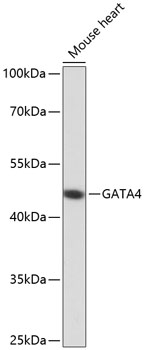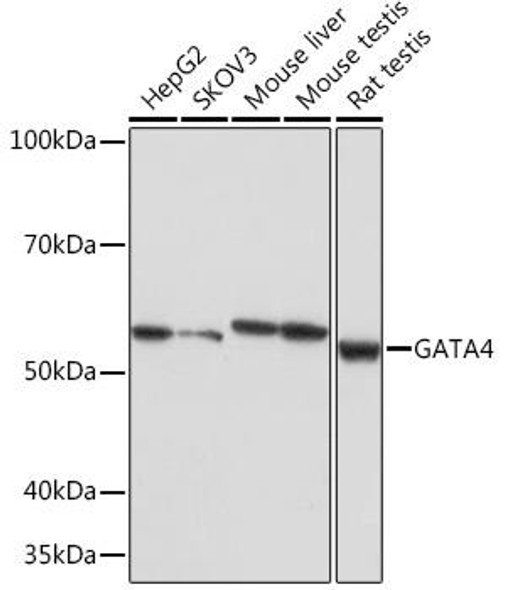Anti-GATA4 Antibody (CAB13756)
- SKU:
- CAB13756
- Product type:
- Antibody
- Reactivity:
- Mouse
- Rat
- Host Species:
- Rabbit
- Isotype:
- IgG
- Antibody Type:
- Polyclonal Antibody
- Research Area:
- Epigenetics and Nuclear Signaling
Description
| Antibody Name: | Anti-GATA4 Antibody |
| Antibody SKU: | CAB13756 |
| Antibody Size: | 20uL, 50uL, 100uL |
| Application: | WB |
| Reactivity: | Mouse, Rat |
| Host Species: | Rabbit |
| Immunogen: | A synthetic peptide corresponding to a sequence within amino acids 50-150 of human GATA4 (NP_002043.2). |
| Application: | WB |
| Recommended Dilution: | WB 1:500 - 1:2000 |
| Reactivity: | Mouse, Rat |
| Positive Samples: | Mouse heart |
| Immunogen: | A synthetic peptide corresponding to a sequence within amino acids 50-150 of human GATA4 (NP_002043.2). |
| Purification Method: | Affinity purification |
| Storage Buffer: | Store at -20°C. Avoid freeze / thaw cycles. Buffer: PBS with 0.02% sodium azide, 50% glycerol, pH7.3. |
| Isotype: | IgG |
| Sequence: | GLSY LQGG GAGS ASGG ASGG SSGG AASG AGPG TQQG SPGW SQAG ADGA AYTP PPVS PRFS FPGT TGSL AAAA AAAA AREA AAYS SGGG AAGA GLAG REQY G |
| Gene ID: | 2626 |
| Uniprot: | P43694 |
| Cellular Location: | Nucleus |
| Calculated MW: | 44kDa |
| Observed MW: | 44kDa |
| Synonyms: | GATA4, ASD2, TACHD, TOF, VSD1 |
| Background: | This gene encodes a member of the GATA family of zinc-finger transcription factors. Members of this family recognize the GATA motif which is present in the promoters of many genes. This protein is thought to regulate genes involved in embryogenesis and in myocardial differentiation and function, and is necessary for normal testicular development. Mutations in this gene have been associated with cardiac septal defects. Additionally, alterations in gene expression have been associated with several cancer types. Alternative splicing results in multiple transcript variants. |
| UniProt Protein Function: | GATA4: a conserved and ubiquitous member of the GATA family of zinc-finger transcription factors. Members of this family recognize the GATA motif which is present in the promoters of many genes. This protein is thought to regulate genes involved in embryogenesis and in myocardial differentiation and function. May regulate a set of cardiac-specific genes and play a crucial role in cardiogenesis. Defects are a cause of atrial septal defect 2 (ASD2). ASD2 is an autosomal dominant condition with atrial septal defect and other congenital heart disease but no conduction defects or noncardiac abnormalities. |
| UniProt Protein Details: | Protein type:Motility/polarity/chemotaxis; Transcription factor Chromosomal Location of Human Ortholog: 8p23.1-p22 Cellular Component: nucleoplasm; nucleus Molecular Function:chromatin binding; DNA binding; protein binding; sequence-specific DNA binding; transcription activator binding; transcription coactivator activity; transcription factor activity; transcription factor binding Biological Process: anatomical structure formation; blood coagulation; cell development; cell fate commitment; cell-cell signaling; embryonic foregut morphogenesis; embryonic heart tube anterior/posterior pattern formation; endoderm development; heart looping; male gonad development; positive regulation of angiogenesis; positive regulation of cardioblast differentiation; positive regulation of transcription from RNA polymerase II promoter; positive regulation of transcription, DNA-dependent; regulation of transcription, DNA-dependent; response to drug; transcription from RNA polymerase II promoter Disease: Atrial Septal Defect 2; Atrioventricular Septal Defect 4; Testicular Anomalies With Or Without Congenital Heart Disease; Tetralogy Of Fallot; Ventricular Septal Defect 1 |
| NCBI Summary: | This gene encodes a member of the GATA family of zinc-finger transcription factors. Members of this family recognize the GATA motif which is present in the promoters of many genes. This protein is thought to regulate genes involved in embryogenesis and in myocardial differentiation and function, and is necessary for normal testicular development. Mutations in this gene have been associated with cardiac septal defects. Additionally, alterations in gene expression have been associated with several cancer types. Alternative splicing results in multiple transcript variants. [provided by RefSeq, Apr 2015] |
| UniProt Code: | P43694 |
| NCBI GenInfo Identifier: | 215274105 |
| NCBI Gene ID: | 2626 |
| NCBI Accession: | P43694.2 |
| UniProt Secondary Accession: | P43694,Q3MJ45, Q5IFM8, B7ZKX0, B7ZKZ4, |
| UniProt Related Accession: | P43694 |
| Molecular Weight: | 44,665 Da |
| NCBI Full Name: | Transcription factor GATA-4 |
| NCBI Synonym Full Names: | GATA binding protein 4 |
| NCBI Official Symbol: | GATA4 |
| NCBI Official Synonym Symbols: | TOF; ASD2; VSD1; TACHD |
| NCBI Protein Information: | transcription factor GATA-4 |
| UniProt Protein Name: | Transcription factor GATA-4 |
| UniProt Synonym Protein Names: | GATA-binding factor 4 |
| Protein Family: | GATA transcription factor |
| UniProt Gene Name: | GATA4 |
| UniProt Entry Name: | GATA4_HUMAN |



